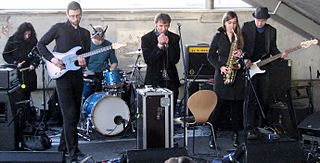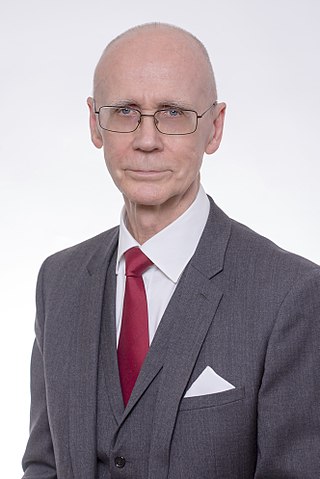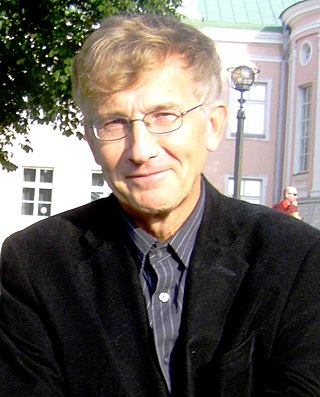
The Eurovision Song Contest 2002 was the 47th edition of the Eurovision Song Contest. It took place in Tallinn, Estonia, following the country's victory at the 2001 contest with the song "Everybody" by Tanel Padar, Dave Benton and 2XL. Organised by the European Broadcasting Union (EBU) and host broadcaster Eesti Televisioon (ETV), the contest was held at the Saku Suurhall on 25 May 2002. The contest was presented by Estonian opera singer Annely Peebo and actor Marko Matvere. It was the first Eurovision Song Contest held in one of the former Soviet republics.

The Estonian Air Force is the aviation branch of the Estonian Defence Forces. The air force traces its history to 1918, and was re-established in its current form in 1991.

SBS Radio is an Australian radio network owned by the Special Broadcasting Service directed towards newly arrived immigrants in Australia. It originally began as two stations based in Melbourne and Sydney, set up to provide pre-recorded information about the then-new Medibank health care system in languages other than English. Nowadays, the network targets the estimated 4+ million Australians who speak a language other than English at home with programs in 68 languages.

Eesti Rahvusringhääling (ERR) – Estonian Public Broadcasting – is a publicly funded and owned radio and television organisation created in Estonia on 1 June 2007 to take over the functions of the formerly separate Eesti Raadio (ER) and Eesti Televisioon (ETV), under the terms of the Estonian National Broadcasting Act. The first chair of ERR is Margus Allikmaa, the former chair of Eesti Raadio. Present CEO is Erik Roose.
Since 1991 Estonia has changed from being a former Soviet republic to a member of the European Union and the European Monetary Union, making a rapid transformation in several fields, including the mass media, which is a vibrant and competitive sector. For many years Estonia has been among the top ten in Reporters Without Borders’ (RSF) Press Freedom Index. In 2017 it was ranked 12th out of 180 countries by RSF while Freedom House assigned Estonia’s press freedom a score of 16/100. A cross-media landscape that embraces traditional media as well as the Internet and digital media characterises the contemporary media system in Estonia.
Eesti Raadio was the public service radio broadcaster of Estonia that, at the time of closure, operated five national radio stations. It was closed in 2007 as a result of a merger with Eesti Televisioon to form the Estonian Public Broadcasting service, or Eesti Rahvusringhääling (ERR).

Sakarias Jaan Leppik is a priest of the Estonian Apostolic Orthodox Church at the Tallinn Cathedral of the Transfiguration of Our Lord. Musician, composer, thinker, culture analyst, theatre and film critic and journalist.
Art Museum of Estonia Friends of Art Society was founded in 2007 with the intention to contribute in the improvement of art in Estonia and to popularize art within the Estonian nation, to introduce Estonian art abroad and also to support the organizing of the exhibitions of the Estonian Art Museum abroad. The goals of the Society are also improving the activity of the Estonian Art Museum, collocating open-minded friends of culture who are interested in contributing in the growth of the collections of the Estonian Art Museum, and also developing and supporting the library of the Estonian Art Museum.
Liis Jürgens (Viira) is an Estonian composer, harpist, and animator. She has also used the pseudonym Liz Wirestring.

Kreatiivmootor is an Estonian band, brought into existence in 2003 by an academic philosopher Roomet Jakapi, PhD, and a lawyer Allan Plekksepp, PhD, who had intended to make music without genre or scene constraints. Their alternative style has ranged from eccentric experimentalism to psychedelic pop. After expanding to become an octet in 2008, the band has used computer programmes, live electronics, guitars, bass, sax, percussion and drums in their live performances. Apart from releasing three albums and standing up at Tallinn Music Week, they have also performed at other festivals, such as Waves Vienna, Positivus in Latvia, Brainlove Festival of Brainlove Records in the UK and Sergey Kuryokhin International Festival in Russia.
Pääru Oja is an Estonian stage, film, voice, and television actor.
Estonia participated in the Eurovision Song Contest 2018 with the song "La forza" written by Mihkel Mattisen, Timo Vendt, Ksenia Kuchukova and Elina Nechayeva. The song was performed by Elina Nechayeva. The Estonian broadcaster Eesti Rahvusringhääling (ERR) organised the national final Eesti Laul 2018 in order to select the Estonian entry for the 2018 contest in Lisbon, Portugal. The national final consisted of three shows: two semi-finals and a final. Ten songs competed in each semi-final and five from each semi-final as determined by a jury panel and public vote qualified to the final. In the final, the winner was selected over two rounds of voting. In the first round, a jury panel and a public vote selected the top three to qualify to the superfinal. In the superfinal, "La forza" performed by Elina Nechayeva was selected as the winner entirely by a public vote.
The Järvi family is a famous Estonian musical family, which was started by the Estonian conductor Vallo Järvi.

Kalle Kurg is an Estonian poet, writer, critic, translator and editor. As a versatile figure in Estonian culture, he has also published caricatures and worked as a theatre director.

Ignar Fjuk is an Estonian architect, politician, and radio journalist, most notable for being one of the voters for the Estonian restoration of Independence.

Joonatan Jürgenson is an Estonian classical pianist from Tõravere. He made his debut at the age of 12 after receiving the 1st prize at the "Young Musician" competition in Tallinn, 2004.

Raadio 2 is Estonian radio station. It belongs to Estonian Public Broadcasting and started broadcasting on 1 May 1993.

Pärnu Concert Hall is a concert hall in Pärnu, Estonia. The hall is operated by Eesti Kontsert. The most solemn events in Pärnu are held there. For example, the Mayor and New Year's Eve celebrations.
Mirjam Tally is an Estonian composer.











